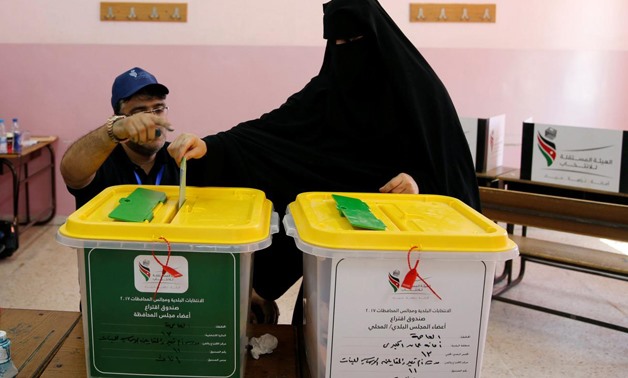
A Jordanian woman casts her ballot at a polling station for local and municipal elections in Amman, Jordan, August 15, 2017-Reuters
CAIRO – 19 August 2017: The surprise performance of a Muslim Brotherhood-led coalition in Jordan’s local elections, held last Tuesday, could presage a new lease on life for the Brotherhood group which took part in the local elections after a decade of boycott.
The Brotherhood now is occupying 11 percent of seats in parliament, running three of the largest municipalities and with representatives in the local governments of eight major cities, including Amman.
 The Muslim Brotherhood supporters in Jordan-File Photo
The Muslim Brotherhood supporters in Jordan-File Photo
The Brotherhood has returned to lead the Jordanian political scene and it will be impossible to deal with them as a terrorist organization or banned group.
In local and provincial polls held last week, the National Alliance for Reform, led by the Islamic Action Front (IAF), the political wing of Jordan’s Muslim Brotherhood, won 25 of the 48 provincial council seats it contested.
The alliance also won 5 out of the Amman Municipality’s 12 seats, and won majorities in the local councils of three of Jordan’s largest municipalities, including the industrial city of Zarqa.
These elections represent an important turning point in the country for several reasons, mainly because, for the first time in the kingdom’s history, they will bring localized powers to cities and rural areas.
The Decentralization Law, which came into force in 2016, is a key cornerstone of the reform process pursued by King Abdullah II since 2011 in Jordan.
For the past seven decades, Jordan has been governed solely by elected members of parliament and a government appointed by the king. Nobody has been able to contest the work of government departments and the king, not even elected parliamentary MPs who seem to be on an “official holiday” most of the time.
According to the Decentralization Law, Jordan will devolve some of its powers to local councils and municipalities, a move which will fundamentally change the way the political systems work in the country.
Out of six major municipalities - which control local services - that the Islamic movement tried to win, they gained control of three, including Zarqa, the largest municipality after Amman.
As for the local councils, which are more important because they will actually govern cities and areas (while the municipalities handle services), 25 out of the 48 Brotherhood candidates who ran for election won, and the group now has representation in the local governments of eight major cities in Jordan.
 A Jordanian woman casts her ballot at a polling station for local and municipal elections in Amman, Jordan, August 15, 2017-Reuters
A Jordanian woman casts her ballot at a polling station for local and municipal elections in Amman, Jordan, August 15, 2017-Reuters
The Jordanian election’s results send a very important message domestically and regionally, particularly to Jordan's allies, most notably Egypt which banned the Brotherhood since September 2013, and who have branded the Muslim Brotherhood as a terrorist group: the movement is a critical part of the Jordanian government, a fact that cannot be ignored.
In 2015, the Jordanian government declared the Brotherhood illegal and gave the license to a splinter Brotherhood group.
, Islamists took part in the parliamentary elections and won 15 seats out of 130 via the National Reform Coalition, while the Islamic Action Front boycotted the elections in 2012 and 2013 in protest against the one-vote electoral system.



Comments
Leave a Comment